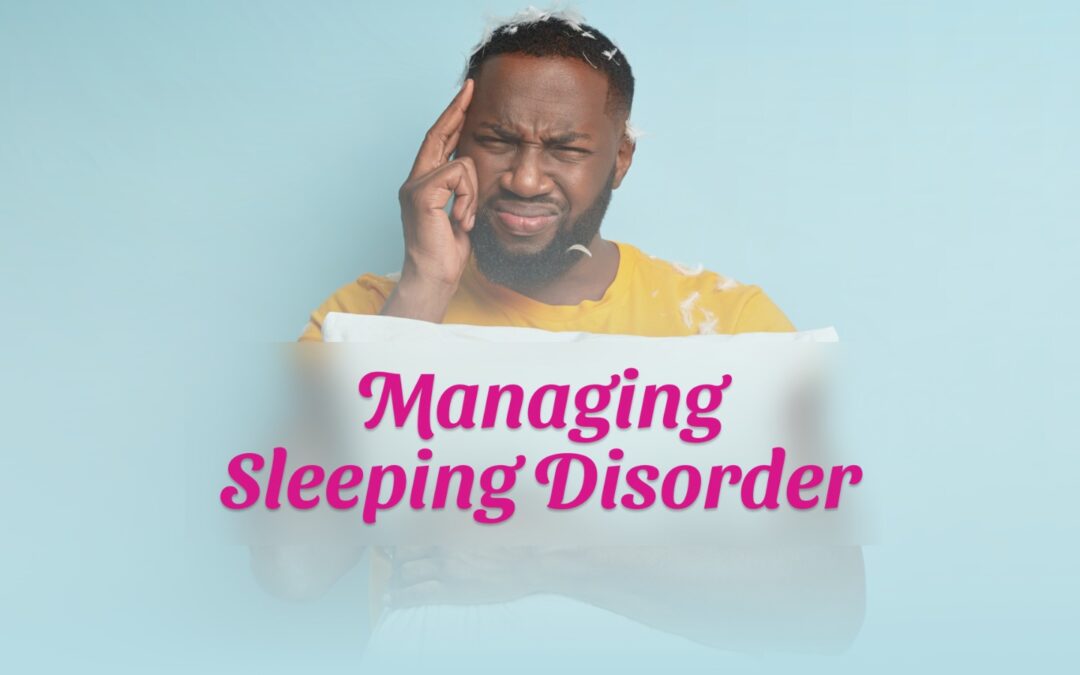Sleep disorder is a medical disorder that affects an individual’s sleep patterns. This usually interferes with the normal physical, mental, social, and emotional functioning of the individual.
Sleep disorders can be based on the timing of sleep which may be dyssomnias, parasomnias, circadian rhythm sleep disorders, or caused by medical or psychological conditions. When a person struggles to fall asleep and/or stay asleep with no obvious cause, it is referred to as insomnia. This is the most common sleep disorder.
TYPES OF SLEEP DISORDER
- Dyssomnias: this is a broad category of sleep disorders. It includes:
- Insomnia: this happens when a person struggles to fall asleep and/or stay asleep with no obvious cause. This may be primary or due to other disorders like emotional stress, anxiety, depression, or underlying health conditions like asthma, diabetes, heart disease, pregnancy, or neurological conditions.
- Hypersomnia: this is usually a disorder of brain origin. It includes:
- Narcolepsy: this is a chronic neurological disorder (or dyssomnia), caused by the brain’s inability to control sleep and wakefulness.
- Idiopathic hypersomnia: this is a chronic neurological disease in which there is an increased amount of fatigue and sleep during the day. Patients suffering from idiopathic hypersomnia cannot obtain a healthy amount of sleep for a regular day of activities and this hinders their ability to perform well. However, patients have to deal with this for the rest of their lives.
- Recurrent hypersomnia, including Kleine–Levin syndrome
- Post-traumatic hypersomnia
- Menstrual-related hypersomnia
- Sleep-disordered breathing (SDB): this may include
- Several types of sleep apnea
- Snoring
- Upper airway resistance syndrome
- Circadian rhythm sleep disorders: this may include
- Delayed sleep phase disorder
- Advanced sleep phase disorder
- Non-24-hour sleep-wake disorder.
- Parasomnias: this is a category of sleep disorders that involve abnormal and unnatural movements, behaviors, emotions, perceptions, and dreams in connection with sleep. This may include:
- Bedwetting or sleep enuresis
- Bruxism (Tooth-grinding)
- Catathrenia: nocturnal groaning
- Exploding head syndrome: Waking up in the night hearing loud noises.
- Sleep terror (or Pavor nocturnus) – Characterized by a sudden arousal from deep sleep with a scream or cry, accompanied by some behavioral manifestations of intense fear.
- sleepwalking (or somnambulism)
- sleep talking (or somniloquy)
- Medical or psychiatric conditions that may produce sleep disorders
- Alcoholism
- Mood disorders like depression.
- Anxiety disorder
- Nightmare disorder
- Panic
- Dissociative identity disorder
- Psychosis (such as Schizophrenia)
- Sleeping sickness – a parasitic disease which can be transmitted by the tsetse fly.
Some Types of sleep disorders?
There are over 80 different types of sleep disorders. The most common include:
1. Chronic insomnia: You have trouble falling asleep or staying asleep most nights for at least three months and feel tired or irritable as a result.
2. Obstructive sleep apnea: You snore and have moments during sleep when you stop breathing that disrupt your sleep.
3. Restless legs syndrome: You have the urge to move your legs when you rest.
4. Narcolepsy: You can’t regulate when you fall asleep or how long you stay awake.
5. Shift work sleep disorder: You have trouble falling asleep and staying asleep and feel sleepiness at unwanted times due to your work schedule.
6. Delayed sleep phase syndrome: You fall asleep at least two hours after your desired bedtime and have difficulty waking up in time for school or work.
7. REM sleep behavior disorder: You act out your dreams while in the rapid eye movement (REM) stage of sleep.
Symptoms of Sleep Disorders.
Difficulty falling asleep or it takes more than 30 minutes to fall asleep regularly.
Trouble staying asleep through the night or you wake up often in the middle of the night and can’t fall back asleep.
Snoring, gasping or choking happens during sleep.
Feeling like you need to move when you relax. Movement relieves this feeling.
Feeling like you can’t move when you wake up.
During the daytime, you may experience additional signs and symptoms caused by a lack of adequate sleep including:
Daytime sleepiness; you take frequent daytime naps or fall asleep while doing routine tasks.
SLEEP HYGIENE.
Sleep hygiene includes making changes to your sleeping routine to create an optimal sleeping environment. You can get better sleep by:
Creating a comfortable sleep environment: Make sure your bedroom is cool, quiet and dark. If noise keeps you awake, try using background sounds like “white noise” or earplugs. If light interferes with your sleep, try a sleep mask or blackout curtains.
Minimizing stress: Try to reduce how much stress you feel before going to bed. You may choose to write things down like making a to-do list earlier in the evening. This is helpful if you tend to worry and think too much in bed at night. It also helps to stay positive rather than going to bed with a negative mindset, such as “If I don’t get enough sleep tonight, how will I ever get through the day tomorrow?”
Avoid using your bed for anything other than sleep and intimate relations: Don’t watch television or videos on your phone, eat or work in your bedroom.
Establishing a regular bedtime routine: Each night, create habits before you go to bed like taking a warm bath, listening to soothing music or reading. Try relaxation exercises or meditation. Wake up at the same time each morning, including days off and vacations.
Not watching the clock: Turn the clock around or turn your phone screen-side down and use only the alarm for waking up. Leave your bedroom if you can’t fall asleep in 20 minutes. Read or engage in a relaxing activity in another room that doesn’t involve screen time
Exercising regularly: Exercising is great to promote positive sleep, but don’t exercise within four hours of bedtime if you have trouble sleeping. Avoid strenuous exercises before you sleep.
MANAGING OF SLEEPING DISORDERS
- Cognitive behavioral therapy: this is sometimes called CBT, can effectively treat long-term sleep problems like insomnia. Generally, it’s the first treatment recommended. CBT helps you find out which thoughts and behaviors cause sleep problems or make them worse and then replace them with habits that support sound sleep. Unlike sleeping pills, CBT helps you overcome the causes of your sleep problems. Some of these behavioral therapies include:
- Change your routine: This can help you sleep better. Set a consistent bedtime and wake time. Avoid naps. Use the bed only for sleep and sex.
- Set sleep limits: Lying in bed when you’re awake can become a habit that leads to poor sleep. If you can’t fall asleep within 20 minutes, get up and don’t go back to bed until you’re sleepy. But don’t change your wake-up time. This makes you more tired the next night. But once your sleep gets better, your time in bed is slowly increased.
Change certain lifestyle habits: Change habits that lead to poor sleep, such as smoking, drinking too much caffeine late in the day, and drinking too much alcohol. Not getting regular physical activity also can lead to poor sleep. You may learn tips that can help you sleep better, such as ways to wind down an hour or two before bedtime.
Improve your sleep area: Create a comfortable sleep area. Keep your bedroom quiet, dark, and cool. Don’t have a TV in the bedroom. Hide the clock from view. - Learn relaxation techniques: These techniques help you calm your mind and body. Approaches include meditation, imagery, and muscle relaxation.
- Remain passively awake: With this method, once you’re in bed, you try not to think about falling asleep. That’s because worrying that you can’t sleep can keep you awake. Letting go of this worry can help you relax and make it easier to fall asleep.
- Use biofeedback: This technique involves using a device that shows signs such as your heart rate and muscle tension. Then you learn how to help manage them. Your sleep specialist may ask you to take a biofeedback device home to record your daily patterns. This information can show patterns that affect sleep.
- Prescription sleeping pills: this can also help you get to sleep, stay asleep, or both. They are usually not recommended for more than a few weeks because over-reliance on sleeping pills has its disadvantages but some of these medications are approved for long-term use. Examples include:
- Eszopiclone (Lunesta)
- Ramelteon (Rozerem)
- Zaleplon (Sonata)
- Zolpidem (Ambien, Edluar, Intermezzo, Zolpimist)
Prescription sleeping pills can have side effects, such as causing daytime grogginess and increasing the risk of falling, or they can be habit-forming, it is important to talk to your doctor about these medications and other possible side effects.
Alternative medicine: Many people never visit their doctor for insomnia and try to cope with sleeplessness on their own. Although in many cases safety and effectiveness have not been proved, some people try therapies such as:
Melatonin. This over-the-counter (OTC) supplement is marketed as a way to help overcome insomnia. It’s generally considered safe to use melatonin for a few weeks, but no convincing evidence exists to prove that melatonin is an effective treatment for insomnia, and its long-term safety is unknown.
Valerian. This dietary supplement is sold as a sleep aid because it has a mildly sedating effect, although it hasn’t been well-studied. Discuss valerian with your doctor before trying it. Some people who have used high doses or used it long term may have had liver damage, although it’s not clear if valerian caused the damage.
Acupuncture. There’s some evidence that acupuncture may be beneficial for people with insomnia, but more research is needed. If you choose to try acupuncture along with your conventional treatment, ask your doctor how to find a qualified practitioner.
Yoga or tai chi. Some studies suggest that the regular practice of yoga or tai chi can help improve sleep quality.
Meditation. Several small studies suggest that meditation, along with conventional treatment, may help improve sleep and reduce stress.
It is important to speak with your doctor before taking any herbal supplements or other OTC products because some products can be harmful and some can cause harm if you’re taking certain medications.
REFERENCES
https://www.mayoclinic.org/diseases-conditions/insomnia/in-depth/insomnia-treatment/art-20046677
https://www.mayoclinic.org/diseases-conditions/insomnia/diagnosis-treatment/drc-20355173#:~:text=Basic%20tips%3A%201%20Stick%20to%20a%20sleep%20schedule.,Avoid%20large%20meals%20and%20beverages%20before%20bed.%20
https://www.psychiatry.org/patients-families/sleep-disorders/what-are-sleep-disorders
https://en.wikipedia.org/wiki/Sleep_disorder#cite_note-:24-1
https://my.clevelandclinic.org/health/diseases/11429-sleep-disorders

